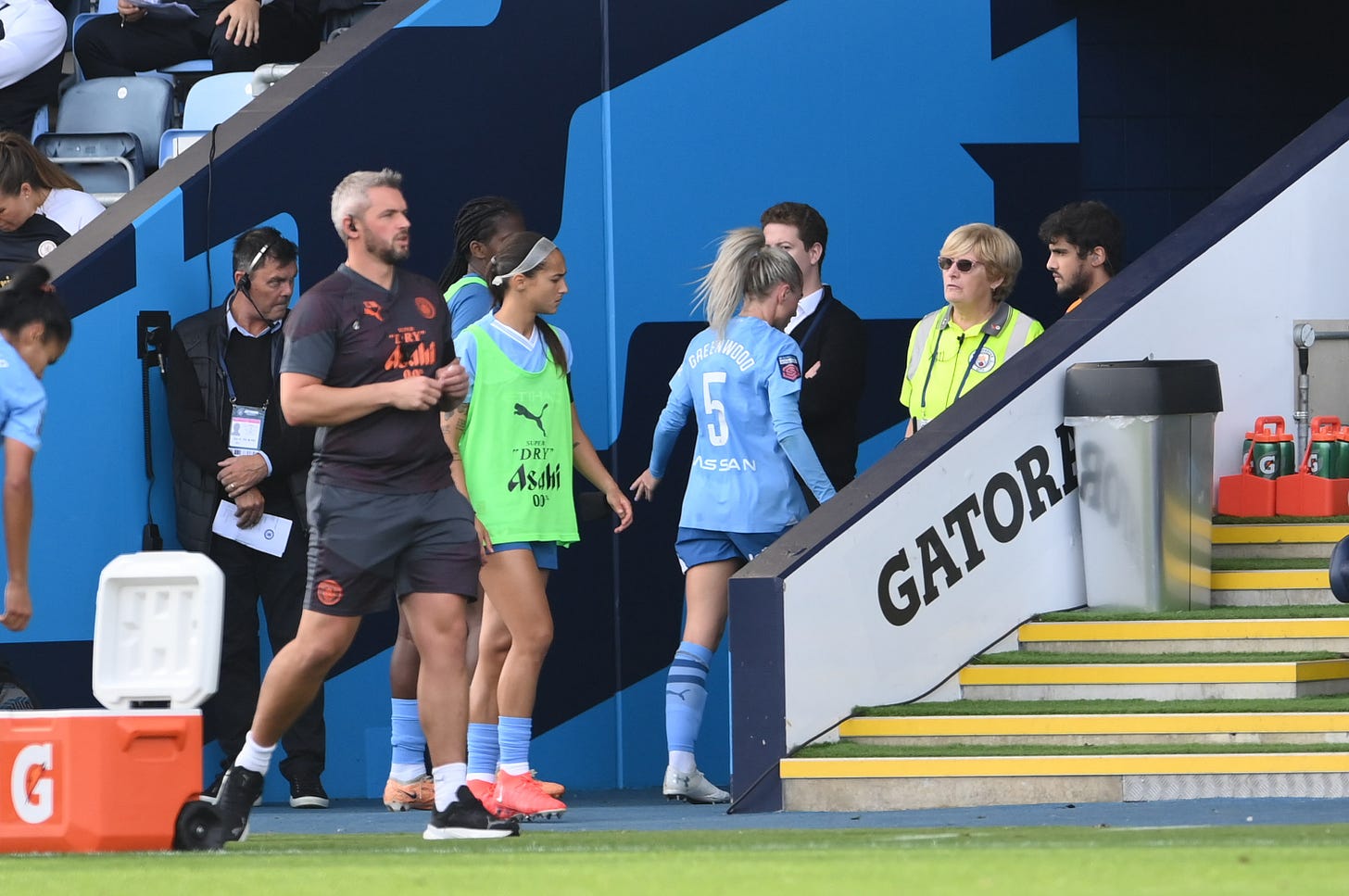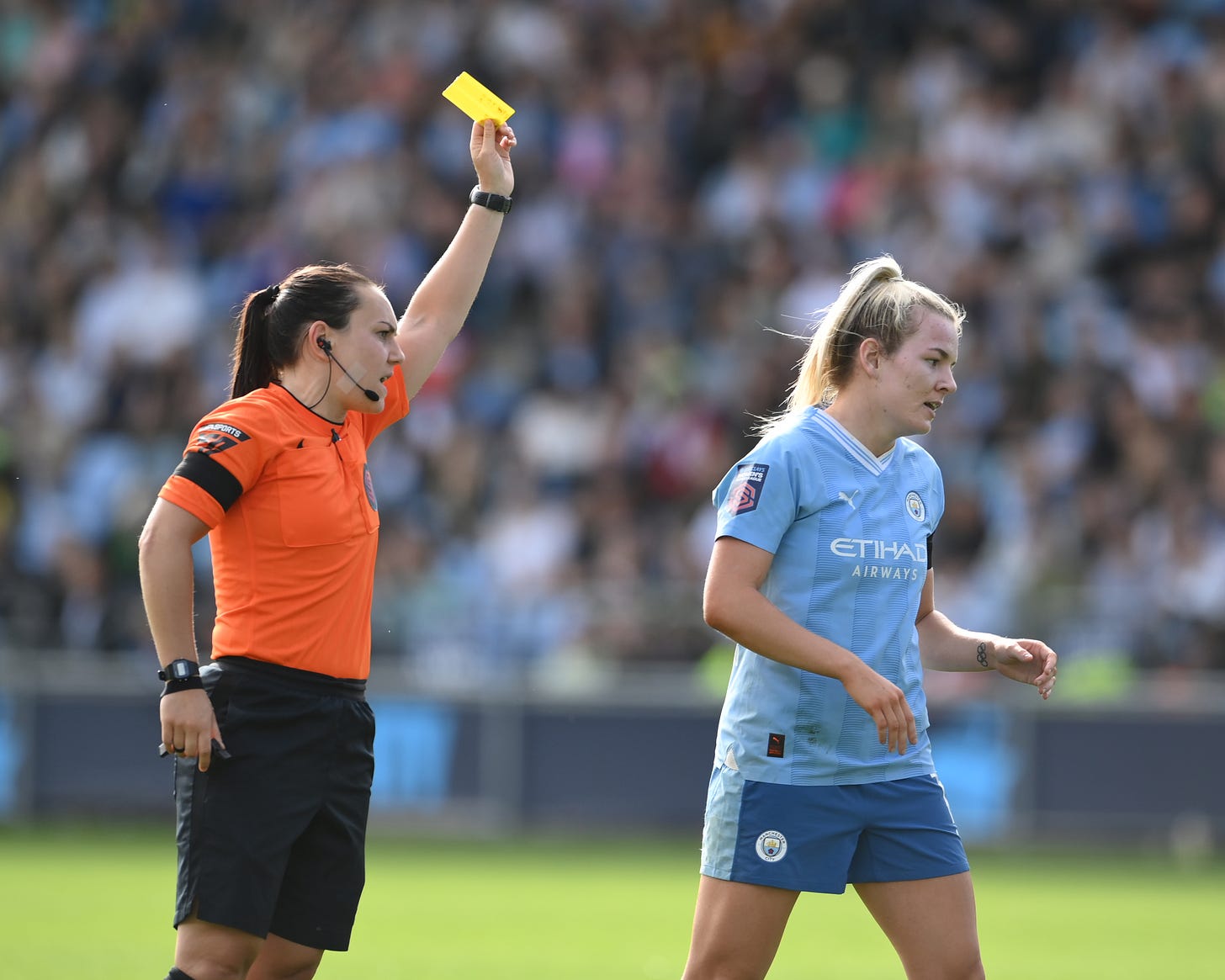Column: Thoughts on the new officiating directives currently causing chaos
Manchester City vs Chelsea in the BWSL has thrown the new laws around time-wasting and dissent further into the spotlight, so how do we balance the law and feeling a game?

It's becoming an ever-increasing talking point across football, whether the Premier League or the Barclays Women's Super League.
Everyone, as Chelsea head coach Emma Hayes hit home post-match on Sunday, was informed of the new directives across the game in pre-season, but there already appears to be inconsistencies in how they're being implemented.
For those who may not know, the FA and PGMOL decided to clamp down on timewasting and dissent for this season, with any obvious examples of either being met with a yellow card for the player in question.
To also tackle timewasting, the leagues have taken on the process we saw at the World Cup, with more stoppage time at the end of halves, seeing some games now being met with at least an extra 15-20 minutes of football across the two halves of 45.
This has been met with concern across the board in an already hectic schedule, but particularly in the women's pyramid where the schedule is already taking a toll on players who are still transitioning physically from part-time to full-time programmes.
Perhaps the most chaotic and controversial example of these new directives yet were on show at Manchester City vs Chelsea at the Joie Stadium on Sunday lunchtime.
The hosts, who pluckily held on to their 1-0 lead until the dying minutes after being reduced to nine players, lost captain Alex Greenwood for supposed timewasting in the first half, before Lauren Hemp followed her for a foul in the second half, after initially being cautioned for protesting a decision to award Chelsea a corner.
When Greenwood was sent off, teammates Laia Aleixandri and Chloe Kelly were also cautioned for their protests, as was Jill Roord as the players walked off for half-time. After Hemp was sent off, head coach Gareth Taylor also went into the book.
Taylor said post-match he had not been aggressive or used any bad language towards the fourth official when he was cautioned, and one critical element we have to remember in this is we don't know what's been said by the four players in question who received cautions for dissent.
That in itself is frustrating, and while the clubs will likely get access to the full officials’ report, the public won’t, so we will likely never know.
The biggest talking point came before the break, when Greenwood took 26 seconds to take a free-kick in her own half. That whole 26 seconds wasn't spent dallying, she set the free-kick up, assessed her options a few times and eventually took the safe option to square the ball to centre-back partner Alanna Kennedy, just as referee Emily Heaslip stepped in to decide enough was enough.
The decision lit a fuse among the home crowd and Heaslip was met with loud boos and various chants for the rest of the afternoon, with every caution being met with louder and louder boos.
Overall, there were more than 10 bookings in the game and two red cards, but as Taylor hit home after the game, this was not a dirty or feisty encounter, and if anything the most rash tackle of the afternoon when unpunished when Ashley Lawrence left Hemp needing treatment, yet Hemp received a second yellow soon after for an arguably softer foul on Lauren James.
I've been part of conversations with officials before games at Sheffield United when teamsheets are being exchanged and they always say they are there to talk to you, yet it never seems to pan out that way during the game, certainly not in Heaslip's case.
Perhaps she was informed to be stricter after criticisms last weekend she allowed Liverpool to timewaste too often in their 1-0 win at the Emirates Stadium against Arsenal.
Check out over 100 more unique stories in WFC’s Premium section, available for just £45 for 12 months, paid in one go, or a £6 a month rolling subscription.
All subscriptions come with a 7-day free trial to allow you to explore our full archive.
Plus, guarantee you everything that is to come over the next 12 months…
Post-match, Taylor asked for consistency, but appeared doubtful every match that weekend or for the rest of the season would be officiated to the same standard as this one, and he's probably right. City have now had three red cards in two games, for very little, but Taylor's most pertinent point in his press conference was about feeling the game.
"There needs to be more allowance...maybe allowance is the wrong word. Maybe more feeling for the game. That game was subdued, it wasn't feisty at that point."
That, in my opinion, is where these new directives - and many other laws in the game - go awry. Football is an emotional game, particularly in the moment, and not everything should be met with a caution.
Hemp's first caution was for protesting a corner, and she didn't go over the top in doing so, and it's incredibly hard to imagine every player who protests a corner for the rest of the season will be met with a similar punishment.
There's also the element of the timing. Greenwood is an established, experienced player who knows the game and Man City were generally on top in the first half, and as Taylor suggested, it was incredibly unlikely his team would be timewasting at that stage, with Greenwood clearly looking for options to play the free-kick away from danger.
This issue reared its head in the Premier League some weeks ago when other managers came out to talk about referees not understanding or having a feeling for the game, which on this specific occasion is even more disappointing given Heaslip is both an experienced official who took charge of - and did well in - last season's FA Cup final, but is also a former player herself.
Heaslip played as recently as the old WSL 2 days - now the Championship - for Watford, and therefore should have a better readng than most on the feeling and emotion in a game, which she appeared to lack on Sunday.
Hayes meanwhile, perhaps understandably, was noncommittal post-match when asked about the officiating, and just reiterated she and her squad had been told what to expect at the start of the season.
I don't think anyone has any doubts over what the new directives and why they're there, but the question is were they implemented correctly on this occasion? And will every game be exposed to the same standards throughout the season? Both answers to those questions you could strongly argue would be no.
Timewasting in particular has had a real clampdown, but it feels like the punishment is too big, or certainly it's an unnecessary double whammy. The powers that be have decided time-wasting will be met with a caution, but also by more time being added on at the end of a game.
Surely, it's one or the other?
When Greenwood was sent off, she and Man City had faced their punishment, and it was a big one. Even if it had been a booking in isolation, it's still a punishment. To then add the extra-time on at the end as well as a red card feels too much for what we saw unfold on Saturday.
In my opinion, if a player is booked, it's been dealt with, with no need to add the time on. We either do that, or we reverse it, and players are not cautioned, but told every single second is added on at the end. If that means 15-20 minutes of added time, so be it, it will soon become a deterrent for most when they realise the extra fatigue they are taking on.
But a caution AND added time? It feels too much when there are bigger issues facing the game right now.
After eight minutes were initially added on in Manchester, the game actually ended up going to the 103rd-minute, while the other TV game later in the day between Liverpool and Aston Villa also hit the 100-minute mark, with Liverpool head coach Matt Beard speaking out about the need to look at player welfare after his side's win.
It's not just the top sides being met with questionable decisions either. Tottenham's Ashleigh Neville was booked for knocking the ball over the head of an opponent against Bristol City, and whether it was 100% intentional is hard to tell, but even so, is a player really going to timewaste in a home game against a newly-promoted side after 22 minutes?
Unlikely, and again, hits home the need for more feeling of the game. The problem is, feeling is hard to write into a law, as is emotion, and perhaps at that stage it should be left to the official to decide what's right, but of course that will lead to the inconsistencies everyone is trying to avoid.
It's easy to criticise Heaslip given how extraordinary Saturday's spectacle was compared to anything we've seen before, and while it definitely feels she was too rash with some of her decisions, there also appears no easy answer to the big questions, and it once again brings us back to the need for some common sense in the game, rather than constantly obsessing about more and more laws and driving emotion out of the game we love.




The issue is, as it always has been, deliberate timewasting. Alex Greenwood wasn't deliberately time wasting. If she'd done that in the 87th minute rather than the 37th minute you could draw a different conclusion. That's were having a feel for the game is appropriate. On Saturday my team had 2 players booked in the first half for time wasting over taking throw ins. Why should a player take punishment for their team mates not giving them options? Adding the time on should be punishment enough. Does this mean a player dummying a free kick will be penalised for time wasting?
As for dissent, it all depends what was said. If the players made derogatory comments or swore then no problem. Asking for explanation of disagreeing with a decision though? A referee should have enough about them to be able to deal without producing a card.